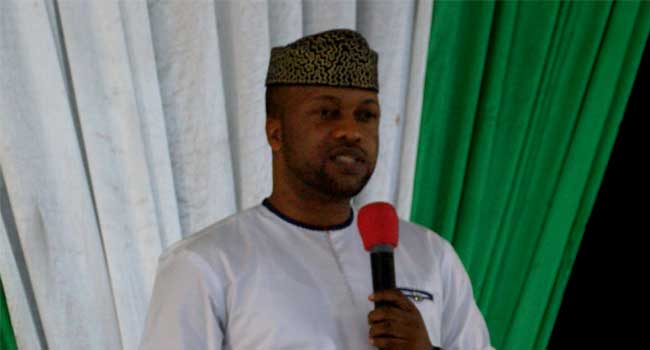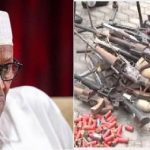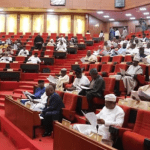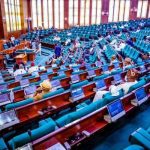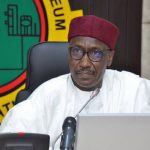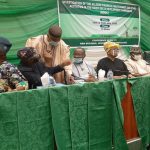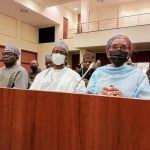Nigeria‘s lower house of parliament has set up a committee to investigate the circumstances surrounding the award of oil prospecting licence (OPL) 245, the committee chairman said on Wednesday.
Courts in Nigeria and Italy are investigating the purchase of the offshore block which was initially awarded in 1998 to Malabu Oil and Gas, in a disputed deal, before Royal Dutch Shell and Eni were awarded the rights in 2011.
Shell and Eni paid $1.3 billion for the rights to the block, which industry estimates say could hold more than 9 billion barrels of oil.
The House of Representatives mandated the committee to “conduct a thorough examination of the process and circumstances surrounding OPL 245 and identify culpability of any persons, groups or organisations,” committee chairman Razak Atunwa said in an emailed statement.
“The committee is aware of recent information that has come to light, both nationally and internationally, indicating that former President Goodluck Ebele Jonathan may have been complicit in the controversial OPL 245 deal,” said the statement.
The statement said the committee was “considering inviting him to give evidence” on the grounds that he “may well be in a position to assist it with its inquiries”.
It added that an announcement would be made once a formal firm decision had been taken on whether or not to call Jonathan, who served as president from 2009 to 2015.

The licence for the oil block was awarded to Malabu in 1998 under then-President Sani Abacha, although a successive government revoked the licence. Malabu appealed that decision, and the status of the licence was uncertain at the time that Shell finalised its deal with the Nigerian government in 2011.
Jonathan’s spokesman issued a statement on Tuesday in which he said allegations that the former president benefited from the proceeds of the oil block’s sale were entirely false.
“Common sense should have shown the purveyors of this slander that the Malabu oil deal far predated the Jonathan regime and it would only make sense for him to be bribed if he had a time machine to go back in time to when the deal was struck,” said Jonathan’s spokesman, Ikechukwu Eze.
Shell on Tuesday said it was aware that some of the payments it made to Nigeria for rights to the oilfield in the 2011 deal would go to a company associated with former Nigerian oil minister and convicted money launderer Dan Etete.
Nigeria‘s lower house of parliament has set up a committee to investigate the circumstances surrounding the award of oil prospecting licence (OPL) 245, the committee chairman said on Wednesday.
Courts in Nigeria and Italy are investigating the purchase of the offshore block which was initially awarded in 1998 to Malabu Oil and Gas, in a disputed deal, before Royal Dutch Shell and Eni were awarded the rights in 2011.
Shell and Eni paid $1.3 billion for the rights to the block, which industry estimates say could hold more than 9 billion barrels of oil.
The House of Representatives mandated the committee to “conduct a thorough examination of the process and circumstances surrounding OPL 245 and identify culpability of any persons, groups or organisations,” committee chairman Razak Atunwa said in an emailed statement.
“The committee is aware of recent information that has come to light, both nationally and internationally, indicating that former President Goodluck Ebele Jonathan may have been complicit in the controversial OPL 245 deal,” said the statement.
The statement said the committee was “considering inviting him to give evidence” on the grounds that he “may well be in a position to assist it with its inquiries”.
It added that an announcement would be made once a formal firm decision had been taken on whether or not to call Jonathan, who served as president from 2009 to 2015.

The licence for the oil block was awarded to Malabu in 1998 under then-President Sani Abacha, although a successive government revoked the licence. Malabu appealed that decision, and the status of the licence was uncertain at the time that Shell finalised its deal with the Nigerian government in 2011.
Jonathan’s spokesman issued a statement on Tuesday in which he said allegations that the former president benefited from the proceeds of the oil block’s sale were entirely false.
“Common sense should have shown the purveyors of this slander that the Malabu oil deal far predated the Jonathan regime and it would only make sense for him to be bribed if he had a time machine to go back in time to when the deal was struck,” said Jonathan’s spokesman, Ikechukwu Eze.
Shell on Tuesday said it was aware that some of the payments it made to Nigeria for rights to the oilfield in the 2011 deal would go to a company associated with former Nigerian oil minister and convicted money launderer Dan Etete.
Nigeria‘s lower house of parliament has set up a committee to investigate the circumstances surrounding the award of oil prospecting licence (OPL) 245, the committee chairman said on Wednesday.
Courts in Nigeria and Italy are investigating the purchase of the offshore block which was initially awarded in 1998 to Malabu Oil and Gas, in a disputed deal, before Royal Dutch Shell and Eni were awarded the rights in 2011.
Shell and Eni paid $1.3 billion for the rights to the block, which industry estimates say could hold more than 9 billion barrels of oil.
The House of Representatives mandated the committee to “conduct a thorough examination of the process and circumstances surrounding OPL 245 and identify culpability of any persons, groups or organisations,” committee chairman Razak Atunwa said in an emailed statement.
“The committee is aware of recent information that has come to light, both nationally and internationally, indicating that former President Goodluck Ebele Jonathan may have been complicit in the controversial OPL 245 deal,” said the statement.
The statement said the committee was “considering inviting him to give evidence” on the grounds that he “may well be in a position to assist it with its inquiries”.
It added that an announcement would be made once a formal firm decision had been taken on whether or not to call Jonathan, who served as president from 2009 to 2015.

The licence for the oil block was awarded to Malabu in 1998 under then-President Sani Abacha, although a successive government revoked the licence. Malabu appealed that decision, and the status of the licence was uncertain at the time that Shell finalised its deal with the Nigerian government in 2011.
Jonathan’s spokesman issued a statement on Tuesday in which he said allegations that the former president benefited from the proceeds of the oil block’s sale were entirely false.
“Common sense should have shown the purveyors of this slander that the Malabu oil deal far predated the Jonathan regime and it would only make sense for him to be bribed if he had a time machine to go back in time to when the deal was struck,” said Jonathan’s spokesman, Ikechukwu Eze.
Shell on Tuesday said it was aware that some of the payments it made to Nigeria for rights to the oilfield in the 2011 deal would go to a company associated with former Nigerian oil minister and convicted money launderer Dan Etete.
Nigeria‘s lower house of parliament has set up a committee to investigate the circumstances surrounding the award of oil prospecting licence (OPL) 245, the committee chairman said on Wednesday.
Courts in Nigeria and Italy are investigating the purchase of the offshore block which was initially awarded in 1998 to Malabu Oil and Gas, in a disputed deal, before Royal Dutch Shell and Eni were awarded the rights in 2011.
Shell and Eni paid $1.3 billion for the rights to the block, which industry estimates say could hold more than 9 billion barrels of oil.
The House of Representatives mandated the committee to “conduct a thorough examination of the process and circumstances surrounding OPL 245 and identify culpability of any persons, groups or organisations,” committee chairman Razak Atunwa said in an emailed statement.
“The committee is aware of recent information that has come to light, both nationally and internationally, indicating that former President Goodluck Ebele Jonathan may have been complicit in the controversial OPL 245 deal,” said the statement.
The statement said the committee was “considering inviting him to give evidence” on the grounds that he “may well be in a position to assist it with its inquiries”.
It added that an announcement would be made once a formal firm decision had been taken on whether or not to call Jonathan, who served as president from 2009 to 2015.

The licence for the oil block was awarded to Malabu in 1998 under then-President Sani Abacha, although a successive government revoked the licence. Malabu appealed that decision, and the status of the licence was uncertain at the time that Shell finalised its deal with the Nigerian government in 2011.
Jonathan’s spokesman issued a statement on Tuesday in which he said allegations that the former president benefited from the proceeds of the oil block’s sale were entirely false.
“Common sense should have shown the purveyors of this slander that the Malabu oil deal far predated the Jonathan regime and it would only make sense for him to be bribed if he had a time machine to go back in time to when the deal was struck,” said Jonathan’s spokesman, Ikechukwu Eze.
Shell on Tuesday said it was aware that some of the payments it made to Nigeria for rights to the oilfield in the 2011 deal would go to a company associated with former Nigerian oil minister and convicted money launderer Dan Etete.
Nigeria‘s lower house of parliament has set up a committee to investigate the circumstances surrounding the award of oil prospecting licence (OPL) 245, the committee chairman said on Wednesday.
Courts in Nigeria and Italy are investigating the purchase of the offshore block which was initially awarded in 1998 to Malabu Oil and Gas, in a disputed deal, before Royal Dutch Shell and Eni were awarded the rights in 2011.
Shell and Eni paid $1.3 billion for the rights to the block, which industry estimates say could hold more than 9 billion barrels of oil.
The House of Representatives mandated the committee to “conduct a thorough examination of the process and circumstances surrounding OPL 245 and identify culpability of any persons, groups or organisations,” committee chairman Razak Atunwa said in an emailed statement.
“The committee is aware of recent information that has come to light, both nationally and internationally, indicating that former President Goodluck Ebele Jonathan may have been complicit in the controversial OPL 245 deal,” said the statement.
The statement said the committee was “considering inviting him to give evidence” on the grounds that he “may well be in a position to assist it with its inquiries”.
It added that an announcement would be made once a formal firm decision had been taken on whether or not to call Jonathan, who served as president from 2009 to 2015.

The licence for the oil block was awarded to Malabu in 1998 under then-President Sani Abacha, although a successive government revoked the licence. Malabu appealed that decision, and the status of the licence was uncertain at the time that Shell finalised its deal with the Nigerian government in 2011.
Jonathan’s spokesman issued a statement on Tuesday in which he said allegations that the former president benefited from the proceeds of the oil block’s sale were entirely false.
“Common sense should have shown the purveyors of this slander that the Malabu oil deal far predated the Jonathan regime and it would only make sense for him to be bribed if he had a time machine to go back in time to when the deal was struck,” said Jonathan’s spokesman, Ikechukwu Eze.
Shell on Tuesday said it was aware that some of the payments it made to Nigeria for rights to the oilfield in the 2011 deal would go to a company associated with former Nigerian oil minister and convicted money launderer Dan Etete.
Nigeria‘s lower house of parliament has set up a committee to investigate the circumstances surrounding the award of oil prospecting licence (OPL) 245, the committee chairman said on Wednesday.
Courts in Nigeria and Italy are investigating the purchase of the offshore block which was initially awarded in 1998 to Malabu Oil and Gas, in a disputed deal, before Royal Dutch Shell and Eni were awarded the rights in 2011.
Shell and Eni paid $1.3 billion for the rights to the block, which industry estimates say could hold more than 9 billion barrels of oil.
The House of Representatives mandated the committee to “conduct a thorough examination of the process and circumstances surrounding OPL 245 and identify culpability of any persons, groups or organisations,” committee chairman Razak Atunwa said in an emailed statement.
“The committee is aware of recent information that has come to light, both nationally and internationally, indicating that former President Goodluck Ebele Jonathan may have been complicit in the controversial OPL 245 deal,” said the statement.
The statement said the committee was “considering inviting him to give evidence” on the grounds that he “may well be in a position to assist it with its inquiries”.
It added that an announcement would be made once a formal firm decision had been taken on whether or not to call Jonathan, who served as president from 2009 to 2015.

The licence for the oil block was awarded to Malabu in 1998 under then-President Sani Abacha, although a successive government revoked the licence. Malabu appealed that decision, and the status of the licence was uncertain at the time that Shell finalised its deal with the Nigerian government in 2011.
Jonathan’s spokesman issued a statement on Tuesday in which he said allegations that the former president benefited from the proceeds of the oil block’s sale were entirely false.
“Common sense should have shown the purveyors of this slander that the Malabu oil deal far predated the Jonathan regime and it would only make sense for him to be bribed if he had a time machine to go back in time to when the deal was struck,” said Jonathan’s spokesman, Ikechukwu Eze.
Shell on Tuesday said it was aware that some of the payments it made to Nigeria for rights to the oilfield in the 2011 deal would go to a company associated with former Nigerian oil minister and convicted money launderer Dan Etete.
Nigeria‘s lower house of parliament has set up a committee to investigate the circumstances surrounding the award of oil prospecting licence (OPL) 245, the committee chairman said on Wednesday.
Courts in Nigeria and Italy are investigating the purchase of the offshore block which was initially awarded in 1998 to Malabu Oil and Gas, in a disputed deal, before Royal Dutch Shell and Eni were awarded the rights in 2011.
Shell and Eni paid $1.3 billion for the rights to the block, which industry estimates say could hold more than 9 billion barrels of oil.
The House of Representatives mandated the committee to “conduct a thorough examination of the process and circumstances surrounding OPL 245 and identify culpability of any persons, groups or organisations,” committee chairman Razak Atunwa said in an emailed statement.
“The committee is aware of recent information that has come to light, both nationally and internationally, indicating that former President Goodluck Ebele Jonathan may have been complicit in the controversial OPL 245 deal,” said the statement.
The statement said the committee was “considering inviting him to give evidence” on the grounds that he “may well be in a position to assist it with its inquiries”.
It added that an announcement would be made once a formal firm decision had been taken on whether or not to call Jonathan, who served as president from 2009 to 2015.

The licence for the oil block was awarded to Malabu in 1998 under then-President Sani Abacha, although a successive government revoked the licence. Malabu appealed that decision, and the status of the licence was uncertain at the time that Shell finalised its deal with the Nigerian government in 2011.
Jonathan’s spokesman issued a statement on Tuesday in which he said allegations that the former president benefited from the proceeds of the oil block’s sale were entirely false.
“Common sense should have shown the purveyors of this slander that the Malabu oil deal far predated the Jonathan regime and it would only make sense for him to be bribed if he had a time machine to go back in time to when the deal was struck,” said Jonathan’s spokesman, Ikechukwu Eze.
Shell on Tuesday said it was aware that some of the payments it made to Nigeria for rights to the oilfield in the 2011 deal would go to a company associated with former Nigerian oil minister and convicted money launderer Dan Etete.
Nigeria‘s lower house of parliament has set up a committee to investigate the circumstances surrounding the award of oil prospecting licence (OPL) 245, the committee chairman said on Wednesday.
Courts in Nigeria and Italy are investigating the purchase of the offshore block which was initially awarded in 1998 to Malabu Oil and Gas, in a disputed deal, before Royal Dutch Shell and Eni were awarded the rights in 2011.
Shell and Eni paid $1.3 billion for the rights to the block, which industry estimates say could hold more than 9 billion barrels of oil.
The House of Representatives mandated the committee to “conduct a thorough examination of the process and circumstances surrounding OPL 245 and identify culpability of any persons, groups or organisations,” committee chairman Razak Atunwa said in an emailed statement.
“The committee is aware of recent information that has come to light, both nationally and internationally, indicating that former President Goodluck Ebele Jonathan may have been complicit in the controversial OPL 245 deal,” said the statement.
The statement said the committee was “considering inviting him to give evidence” on the grounds that he “may well be in a position to assist it with its inquiries”.
It added that an announcement would be made once a formal firm decision had been taken on whether or not to call Jonathan, who served as president from 2009 to 2015.

The licence for the oil block was awarded to Malabu in 1998 under then-President Sani Abacha, although a successive government revoked the licence. Malabu appealed that decision, and the status of the licence was uncertain at the time that Shell finalised its deal with the Nigerian government in 2011.
Jonathan’s spokesman issued a statement on Tuesday in which he said allegations that the former president benefited from the proceeds of the oil block’s sale were entirely false.
“Common sense should have shown the purveyors of this slander that the Malabu oil deal far predated the Jonathan regime and it would only make sense for him to be bribed if he had a time machine to go back in time to when the deal was struck,” said Jonathan’s spokesman, Ikechukwu Eze.
Shell on Tuesday said it was aware that some of the payments it made to Nigeria for rights to the oilfield in the 2011 deal would go to a company associated with former Nigerian oil minister and convicted money launderer Dan Etete.

